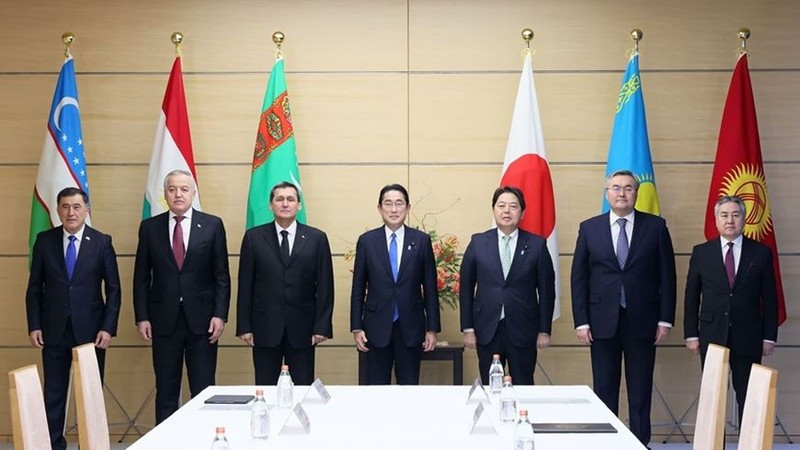Through assistance for sustainable economic development, Japan seeks to expand its partnership with Central Asia, which holds increasing strategic importance as major powers strive to expand their influence in the region.
In a statement before the visit, the Japanese Ministry of Foreign Affairs emphasised that Prime Minister Kishida Fumio's working trip to Central Asia is expected to open up many opportunities, further strengthening economic and trade relations between Japan and countries in the region.
The highlight of Kishida Fumio's schedule is his attendance at Japan's first-ever summit involving five Central Asian nations in Kazakhstan, during which Japan plans to announce an economic aid package for the region.
During his working trip, the Japanese leader will visit Kazakhstan and Uzbekistan. The highlight of Kishida Fumio's schedule is his attendance at Japan's first-ever summit involving five Central Asian nations in Kazakhstan, during which Japan plans to announce an economic aid package for central Asia and make proposals on regional development.
The economic package is centred around the establishment of a trade route. Under the aid plan, Japan will help establish a trade route through the Caspian Sea that will link Central Asia and Europe, in hopes that a stable export route would give the region economic independence.
In the field of decarbonisation, Japanese companies' technologies and loans are expected to be used for such measures as aid in the processing of natural gas. For exchanges, Japan is set to accept skilled workers from the region.
Representatives of 50 Japanese companies, accompanied by Prime Minister Kishida Fumio, will get involved with about 200 cooperation projects.
Located between East Asia and Europe, the Central Asian countries, grouping Uzbekistan, Kazakhstan, Kyrgyzstan, Tajikistan and Turkmenistan, are famous for their rich natural resources. The region is also emerging for its strong economic growth and surging population.
Central Asia's position has been increasingly enhanced, attracting more attention thanks to its abundant oil and resource reserves, economic growth potential, and strategic role in intercontinental trade and global geopolitical developments related to great power competition. Therefore, many parties have sought to strengthen links with the region.
In Central Asia, Japan is not a new partner. According to the Japan International Cooperation Agency (JICA), Japan was one of the first to establish diplomatic relations with countries in the region after the dissolution of the Soviet Union.
Over time, the relationship between Japan and Central Asian countries has been increasingly strengthened. In 2004, the two sides established the ‘Central Asia plus Japan’ dialogue, in which Japan plays the role of a coordinator to promote bilateral cooperation, as well as support the development of Central Asian countries.
The Japanese Ministry of Foreign Affairs emphasised that the Japan-Central Asia Summit is of great significance, as it helps to strengthen Tokyo's commitment to the region while contributing to maintaining a free and open international order. Japan had made careful preparations for the summit and held meetings with ambassadors of Central Asian countries in Japan to listen to their opinions.
Japan has also actively appointed economic specialists to diplomatic missions, including in Central Asian countries. Japan hopes that business cooperation will contribute to promoting growth and creating new vitality for economies in the region.
Recently, Central Asian leaders have held meetings and discussions with Russia, the European Union (EU), China, the Gulf countries, the US, and Germany.
In the context that major powers are constantly striving to expand their influence in the region, the Japan-Central Asia Summit, which marks the 20th anniversary of the "Central Asia plus Japan" Dialogue, will provide an opportunity for the two sides to expand cooperation and further deepen their long-standing partnership.
















